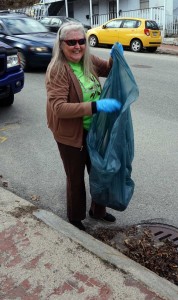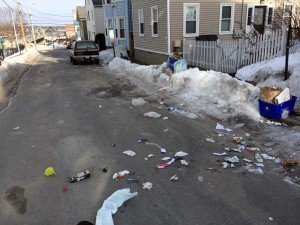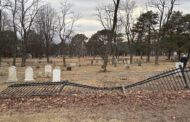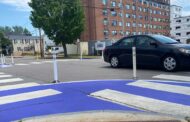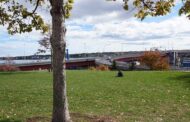by Rosanne Graef, Past President – WENA
Today’s Topic: Your Neighborhood Footprint?
It’s Wednesday. What in years past was known as Prince Spaghetti Day in the North End is now trash day in the West End. A stroll around the neighborhood, checking out what’s set out on the curb, suggests that many folks are keeping body and soul together with pizza, yogurt and Big Gulps. Examining the remains of a week’s worth of West End life could easily be someone’s archaeology practicum. Although that level of analysis is beyond me, it won’t stop me from commenting.
First off, the City of Portland has the pay-per-bag blue or purple trash bags, and some residents pay for the additional service of having their garbage composted. Then there’s the ‘free’ single-stream recycling with its uncovered bins putting residents’ conscientious fastidiousness, blissful ignorance or willful laziness on display for anyone who chooses to look.
We’re all aware (or should be) about watching what we throw out to avoid revealing personal information that might result in tremendous hassles or one of life’s most embarrassing moments. However, do we stop to think not only of what we toss, but how we choose to toss it?
It’s hard to keep up with the plastic situation and what’s recyclable and what’s not, to say nothing about being able to even see those teeny-tiny symbols and numbers on the bottom of some plastic containers. If you want a thorough explanation of the origins and fates of different plastics, take a look at Michael SanClement’s book Plastic Purge: How to Use Less Plastic, Keep Toxins Out of Your Body, and Help Save the Sea Turtles!
It’s available at the Portland Public Library, and will definitely make you think again about the advice given to Benjamin Braddock (Dustin Hoffman) in The Graduate: “I just want to say one word to you. Just one word…Plastics. There’s a great future in plastics.”
Wow, was that right! Americans now consume more than 300 pounds of plastic per person per year, and around 85% of our plastic waste ends up entombed in landfills, essentially forever.
As with most things we purchase and toss(clothes, gadgets, toys, plastic tampon applicators), the most efficient way to deal with this glut of plastic trash is to not buy it.
If you absolutely must fork over some of your hard-earned cash, please remember that your responsible participation in the economy doesn’t end at the cash register. Learn to, and bother to, separate your true trash from the things that are recyclable – no styrofoam, electronics, clothes in the blue bin! Those are trash (styrofoam) or Goodwill or electronics recycling day items.
And don’t leave your bookshelves, microwaves, TVs, broken recliner or tires on the sidewalk for “the City” to take care of! “The City” is all of us and we each need to assume responsibility for our own messes.
We hear a lot about carbon footprints. Think of your Wednesday morning accumulation as your neighborhood footprint. What does yours say about you?
A couple of years ago somebody left a foldaway bed and mattress in the outdoor garden classroom at Reiche school. Why? If you have any insights on this, please let me know at lavidalocalWEN@gmail.com.

